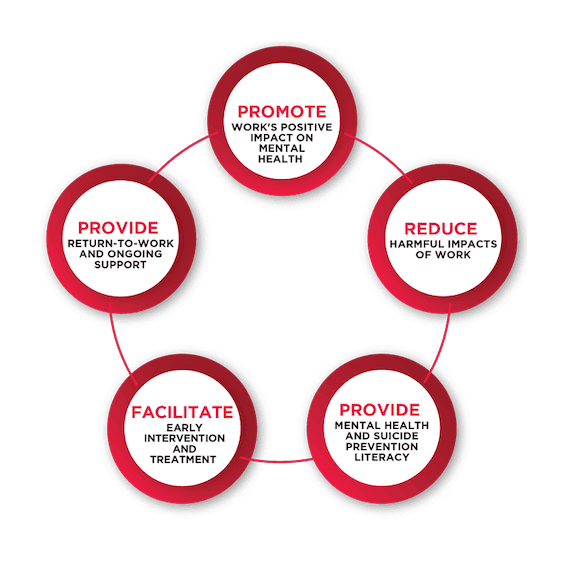Mental Wellbeing in Construction Management

Mental health and wellbeing have been prevailing issues and topics of conversation within the construction industry for a long time, however the severity of the current situation is at a particular standpoint.
Leading charity MATES in Construction has reported that calls to their helpline have doubled in just the last year.
Research consistently shows that workers within the construction industry face much higher rates of depression, anxiety and suicidal tendencies. A 2023 survey from the Black Dog Institute found that 1 in 4 people working in construction experienced severe symptoms of depression and anxiety.
High interest rates, increased costs, labour and materials shortages, long hours and the general nature of construction work are all key factors influencing the current mental health crisis that the industry is experiencing. These factors have compounded with existing issues like culture and a stigma discussing feelings with co-workers.
What's the industry saying?
“You need to be onsite, in person, every single day. The hours people are working are challenging and can result in significant time away from families, which can cause more conflict, and if you are having a rough time you can easily go under the radar with no one noticing.
Peta Wilson, Head of Special Projects | Richard Crookes Construction
“It’s a high pressure environment, which at times can be quite stressful. For me, as I work on live projects and I’m very involved with the day-to-day happenings on site, it can at times feel like you’re drowning in a mountain of work.”
Amani Eljari, Project Manager | Building Engineering
“I was very young and somewhat naive when I entered the industry. Straight out of uni and eager to please. Working 6 days a week, 12 hour days in my eyes was just the 'norm'.
I didn’t experience it but I saw first hand the toll this was having on those in committed relationships with families at home (out of the house before the kids wake up, and home after they go to bed). Relationships were constantly being tested and strained to the breaking point.
Feeling overworked and undervalued was common, which made me realise how challenging this industry can be for maintaining any kind of work-life balance. I lasted 10 years and had to take a year long break from it all.”
Tim Rogers, Co-Founder & Head of Product | ProcurePro and Ex-Contracts Administrator & Project Manager | Hutchinson Builders
The Blueprint Pillars Model

MATES in Construction. (2018–2022). Blueprint for better mental health and suicide prevention.
The Blueprint Pillars Model was developed in 2017 by Australian-based mental health charities MATES and Beyond Blue, with the advice and participation of 52 construction industry leaders.
The Blueprint is a valuable resource for both workers and leaders within the industry who are in need of guidance for addressing mental health within their workplace.
The model draws upon expert advice to identify five pillars that provide the industry with an actionable framework for promoting strong workplace mental health. The five pillars are summarised below.
- Promote work’s positive impact on mental health
Employment provides a sense of identity, achievement and social cohesion that is critical to maintaining mental wellbeing.
- Maintain communication, collaboration and engagement across projects
- Implement a collaborative ‘team-based’, not hierarchical, structure
- Convey social value of projects to team members
- Build up teams and social cohesion
- Encourage regular check-ins and feedback
- Reduce harmful impacts of work
Consider the impact of the type of work, workload, working conditions, fairness and culture on workers.
- Develop mindful policies and procedures
- Train supervisors to reduce harmful impact
- Create peer support groups that provide clear pathways to help
- Reduce excessive workplace stress and offer support after incidences
- Prevent access on-site to the public and pre-plan support strategies
- Prevent feelings of disconnect (FIFO-specific) with adequate communication facilities
“One policy I would wholeheartedly support is a 5 day work week initiative. Alison Mirams, ex-CEO of Roberts Co–one of ProcurePro’s foundation customers–implemented this on some of their projects to great success. Unfortunately, in an industry where time is money, the support required to get behind such an initiative would really have to come from the top (i.e. gov agencies, developers, builders). The impact on mental health would be enormous.”
Tim Rogers, Co-Founder & Head of Product (10 years in construction) | ProcurePro
- Provide mental health and suicide prevention literacy to reduce stigma
Stigma around mental health and suicide within the construction industry prevents people from speaking up and seeking help.
- Provide modules, posters, and flyers about mental health on-site
- Train supervisors in mental health and suicide prevention
- Include mental health education in workforce training
- Facilitate peer support meetings
- Promote a safe workplace for a diverse workforce
- Bring in an industry peer to share their experiences
“We offer Mental Health First Aid training which is about making people aware of some of the signs when someone is struggling and checking in with their peers. All managers participate in the training and everyone is encouraged to act as a 'buddy' for their team mates.
It doesn’t have to be a big deal but just be conscious of people around you and what’s going on with them. You can usually spot the changes in behaviour and attitude and when you do, don’t wait for them to ask for help, take the first step. Sometimes just having a chat and getting things off your chest can be enough to stop the spiral of negativity.”
Peta Wilson, Head of Special Projects | Richard Crookes Construction
- Facilitate early intervention and treatment
Addressing mental health conditions early is the best way to ensure they are effectively managed or cured.
- Develop multiple pathways to support
- Provide access to an Employee Assistance Program (EAP)
- Provide Manager Assistance Programs (MAP)
- Create well supported peer networks
- Train workers to ensure an intervener is always on-site
“We have an extremely supportive workplace where people can speak up if need be. Official and unofficial mentorship programs help, because everyone will have people they feel comfortable speaking to.”
Amani Eljari, Project Manager | Building Engineering
- Provide return-to-work and ongoing support
Anxieties around return-to-work and accommodations after experiencing a mental health crisis can dissuade people from seeking help.
- Develop a suitable duties plan and inform close colleagues of changes in duties
- Communicate with injured workers while they are off work
- Encourage colleagues to stay in touch and build a support network
- Design work around the worker’s ability to ease them back into their role
Access the full Blueprint, learn more about its history and purpose and if interested, register your interest to endorse the framework.
How can I learn more or get help?
MATES in Construction (AU)
MATES is a charity that provides suicide prevention services to construction workers in Queensland and Northern Territory, New South Wales, South Australia and Western Australia.
MATES predominantly provides its services on-site, with a variety of services available to educate, guide, and empower construction workers to address mental health within their workplace.
OzHelp (AU)
OzHelp is an Australian-based organisation that provides mental health and wellbeing programs in ‘high-risk, hard to reach’ industries through both workplace and individual initiatives.
The company was established in 2001, following a spate of suicides in the ACT that highlighted a need for support for targeted support for workers in Australia’s building, construction, transport and logistics industries.
Black Dog Institute (AU)
Black Dog Institute is an Australian-based medical research institute that focuses its efforts on mental health, aiming to “create a mentally healthier world for everyone”.
The institute offers an extensive library of mental health research, digital toolkits, and workplace programs. While most of their services aren't tailored specifically to the construction industry, Black Dog is consistently at the forefront of mental health research, making their resources well worth exploring.
Learn more about Black Dog Institute
MATES in Construction (NZ)
MATES in Construction also has an NZ-based service, with a mission to reduce suicide rates among people working in the construction industry.
Like its Australian counterpart, MATES NZ provides extensive on-site support to both individuals and wider workplaces, training workshops, and industry research.
Learn more about MATES in Construction
Mates in Mind (UK)
Mates in Mind is a UK-based charity that provides research, training, support and services to construction workers struggling with mental health.
Mates in Mind provides in-depth training workshops to workplaces, with over a thousand training days delivered since being established.
The charity fosters a community of ‘Mates in Mind Supporters’, providing exclusive access to courses, discounted counselling rates, annual assessments, and dedicated Support Managers to workplaces.
Learn more about Mates in Mind
Building Mental Health (UK)
Building Mental Health is a UK-based initiative, led by industry experts to provide a framework for improving mental health of workers within the construction industry.
A number of online and offline resources, including expert-led advice for handling mental health on-site, can be accessed on the BMH website.
Stay in the loop
Get notified about ProcurePro updates, including new features, integrations and more!



